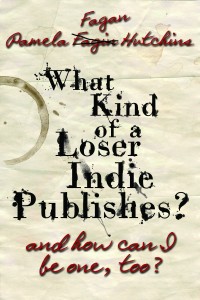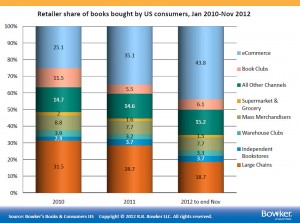An adapted and unedited chapter from my upcoming SkipJack Publishing book (release date August 15, 2013) What kind of loser indie publishes, and how can I be one too?
Ebooks, my friends, are a no-brainer. At the time I wrote Loser, ebooks sales had gobbled up more than 25% of the market for books, books of any and all kinds. Ebooks bear little-to-no per unit cost or other fees to the author too. They are increasingly easy and inexpensive to produce. The main strategic question for ebooks isn’t whether you will do them, but whether you will use an aggregator, where you will sell them, and the file format(s) you will use.
In 2012, Amazon held ~60% of the ebook market share with the sale of Kindle ebooks. Heck, Amazon controls 27% of the book market overall. Not just ecommerce, but the total book market. Talk about the one sales avenue you absolutely cannot ignore!
Why this massive market share for Amazon ebooks? Well, for starters they got there “first,” with online book sales and with ereaders and ebooks. Amazon also makes it inexpensive and easy for readers to read Kindle ebooks. Amazon provides free Kindle ereader applications (apps) for users to download for their mobile devices, tablets, laptops, and computers, and it also sells the very popular Kindle ereader devices. I own a Kindle Fire. My eldest daughter has a Kindle Fire HD. My youngest son and middle daughter have iPads, with Kindle apps on them. My youngest daughter uses a Kindle app on her iPhone.
If you have a Nook, however, which is the Barnes and Noble ereader, you are out of luck on Kindle apps, but no surprise there as Barnes and Noble is trying to beat Amazon by pretending it doesn’t exist. My prediction? Ereaders are out, tablets are in. Ereaders that become tablets will stick around, those that don’t won’t.
Amazon is not the only game in ebook town. Barnes and Noble holds ~25% of the ebook market. Apple has ~10%, and is the real up and comer. Not only is Apple’s iPad tablet an ereader, but Apple sells ebooks (and audio) directly through iTunes, which really appeals to the young adult market. Apple’s strategy of allowing iPad owners to download the Kindle app is markedly different than Barnes and Noble’s, and in my mind the wiser long term approach.
But back to ebook sales and market share. Next comes Kobo, who I think of — at least for now — as the also ran in ebook sales. There are a slew of other options, like Lulu.com, ebooks.com, biblio.com, and omnilit.com, some of which are discussed in a good article on Examiner.com (http://www.examiner.com/article/where-to-upload-your-ebook).
We’re going to focus on the Big Three (Amazon/Kindle, Barnes and Noble/Nook, and Apple/iTunes/iBooks), for the sake of simplicity. A quick Google search will yield more opinions, if you want them.
Aggregators
Before we talk Big Three though, let’s explore aggregators. There are a number of sales outlets that double as sales aggregators. The two players I will talk about are Smashwords and BookBaby . There are, of course, others, including an up-and-comer called Draft2Digital that is getting good buzz. I just think that, right now, Smashwords and BookBaby are the most significant players.
Think of a sales aggregator as a simplifier. The aggregator will upload your ebook for you on many different web sales outlets. You give up some of your revenue in return for their service. BookBaby charges a one-time per-book fee, and you keep 100% of the royalties paid by the sellers. They will upload to a variety of sites, like Apple’s iBooks/iTunes, Amazon Kindle, Barnes and Noble Nook, Sony, Kobo, and others. They also offer a number of author services, like cover design and editing, which you can read about on their website (http://www.BookBaby.com/).
Another aggregator is Smashwords (http://smashwords.com). I have a love-hate relationship with Smashwords, which I not-so-secretly call Aggregator Aggravator. I also know authors who swear by them, so maybe my frustrations are more about me. I’m good with that possibility.
Smashwords charges no upfront fee, and they offer no add-on author services. They upload your ebook to all the usual sales outlets plus a few. They keep 15% of the royalties paid by the web sellers to whom they uploaded on your behalf. They also offer an affiliate referral fee for sales made on their website linked from yours. Most of its retailers pay 60%.
If you allow Smashwords to imprint itself as the publisher of record on your ebook, you get a free ISBN. Some ebook retailers do require ISBNs, although not the Big Three. Another nice feature of Smashwords is that they allow you to offer discount coupons for your ebooks of up to 100%. The benefit to the coupon is that you can leave your sales price intact and still give away books. Since Amazon matches the lowest price on the web, protecting your pricing is important, because you sure as heck don’t want Amazon matching FREE.
While these Smashwords perks are nice, offset them with the difficulty of formatting for Smashwords. Plan on following their instructions (https://www.smashwords.com/books/view/52) to the letter, and add a week into your timeline while you wrestle with it the first time. Want to skip that aggravation? Pay someone $50 to do it for you. Smashwords provides referrals.
My main aggravation with aggregation is that if you want to make changes to your titles’ pricing, availability, content, or description, it may take weeks to show up on the ultimate web sales channels. This reality has hamstrung me many times.
If you aggregate, I think you should choose your provider based on your anticipated volume of sales, at your anticipated profit margin. Smashwords is no-cash outlay with 15% of your sale price going to them, while BookBaby charges a fixed price and you receive 100% of your royalties. Note: Draft2Digital charges 10% of you sales price, thus beating Smashwords on pricing. Multiply your anticipated volume of sales times your expected profit margin. Smashwords is cheaper if you think the resulting number will be lower than the one-time fee charged by BookBaby. BookBaby is probably the better deal if the resulting number is higher than their fee. So, for instance, if you realistically expect to make $1.00 per ebook and to sell 100, then BookBaby at $99 is the better choice for you, which is what BookBaby charges as of the time I am writing Loser.
Catch the Big Three and Strategy Recommendations in my next installment of Loser.
Pamela
Pamela Fagan Hutchins is an employment attorney and workplace investigator by day who writes award-winning and bestselling mysterious women’s fiction (Saving Grace) and humorous nonfiction (How to Screw Up Your Kids) by night. She is passionate about great writing and smart author-preneurship. She also leaps medium-tall buildings in a single bound, if she gets a good running start..



Well I sure learned a lot I didn’t know. It almost seems like everything you have to do will separate the men from the boys – the people who just “wanna” write from those who are “determined” – thank you for sharing this!
You’re welcome 🙂